#network automation with ansible and terraform
Explore tagged Tumblr posts
Text
Ansible vs Terraform: Best DevOps tool?
Ansible vs Terraform: Best DevOps tool? @vexpert #vmwarecommunities #homelab #ansiblevsterraform #cloudinfrastructuremanagement #provisioninginfrastructure #configurationmanagementtools #infrastructureascode #multiclouddeployment #networkautomation
Ansible and Terraform are excellent DevOps tools that can provide many automation benefits in enterprise and cloud environments. Both of them have capabilities that can overlap with each other. However, I would say that each has its strengths in configuring and provisioning infrastructure. Look at Ansible vs Terraform and see which automation tool is best for which task. Table of contentsAt a…
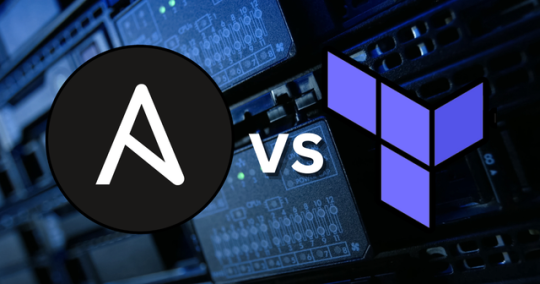
View On WordPress
#ansible vs terraform#automation tools comparison#Cloud Infrastructure Management#configuration management tools#immutable infrastructure approach#infrastructure as code#managing cloud services#multi-cloud deployment#network automation with ansible and terraform#provisioning infrastructure
0 notes
Text
Journey to Devops
The concept of “DevOps” has been gaining traction in the IT sector for a couple of years. It involves promoting teamwork and interaction, between software developers and IT operations groups to enhance the speed and reliability of software delivery. This strategy has become widely accepted as companies strive to provide software to meet customer needs and maintain an edge, in the industry. In this article we will explore the elements of becoming a DevOps Engineer.
Step 1: Get familiar with the basics of Software Development and IT Operations:
In order to pursue a career as a DevOps Engineer it is crucial to possess a grasp of software development and IT operations. Familiarity with programming languages like Python, Java, Ruby or PHP is essential. Additionally, having knowledge about operating systems, databases and networking is vital.
Step 2: Learn the principles of DevOps:
It is crucial to comprehend and apply the principles of DevOps. Automation, continuous integration, continuous deployment and continuous monitoring are aspects that need to be understood and implemented. It is vital to learn how these principles function and how to carry them out efficiently.
Step 3: Familiarize yourself with the DevOps toolchain:
Git: Git, a distributed version control system is extensively utilized by DevOps teams, for code repository management. It aids in monitoring code alterations facilitating collaboration, among team members and preserving a record of modifications made to the codebase.
Ansible: Ansible is an open source tool used for managing configurations deploying applications and automating tasks. It simplifies infrastructure management. Saves time when performing tasks.
Docker: Docker, on the other hand is a platform for containerization that allows DevOps engineers to bundle applications and dependencies into containers. This ensures consistency and compatibility across environments from development, to production.
Kubernetes: Kubernetes is an open-source container orchestration platform that helps manage and scale containers. It helps automate the deployment, scaling, and management of applications and micro-services.
Jenkins: Jenkins is an open-source automation server that helps automate the process of building, testing, and deploying software. It helps to automate repetitive tasks and improve the speed and efficiency of the software delivery process.
Nagios: Nagios is an open-source monitoring tool that helps us monitor the health and performance of our IT infrastructure. It also helps us to identify and resolve issues in real-time and ensure the high availability and reliability of IT systems as well.
Terraform: Terraform is an infrastructure as code (IAC) tool that helps manage and provision IT infrastructure. It helps us automate the process of provisioning and configuring IT resources and ensures consistency between development and production environments.
Step 4: Gain practical experience:
The best way to gain practical experience is by working on real projects and bootcamps. You can start by contributing to open-source projects or participating in coding challenges and hackathons. You can also attend workshops and online courses to improve your skills.
Step 5: Get certified:
Getting certified in DevOps can help you stand out from the crowd and showcase your expertise to various people. Some of the most popular certifications are:
Certified Kubernetes Administrator (CKA)
AWS Certified DevOps Engineer
Microsoft Certified: Azure DevOps Engineer Expert
AWS Certified Cloud Practitioner
Step 6: Build a strong professional network:
Networking is one of the most important parts of becoming a DevOps Engineer. You can join online communities, attend conferences, join webinars and connect with other professionals in the field. This will help you stay up-to-date with the latest developments and also help you find job opportunities and success.
Conclusion:
You can start your journey towards a successful career in DevOps. The most important thing is to be passionate about your work and continuously learn and improve your skills. With the right skills, experience, and network, you can achieve great success in this field and earn valuable experience.
2 notes
·
View notes
Text
DevOps Landscape: Building Blocks for a Seamless Transition
In the dynamic realm where software development intersects with operations, the role of a DevOps professional has become instrumental. For individuals aspiring to make the leap into this dynamic field, understanding the key building blocks can set the stage for a successful transition. While there are no rigid prerequisites, acquiring foundational skills and knowledge areas becomes pivotal for thriving in a DevOps role.
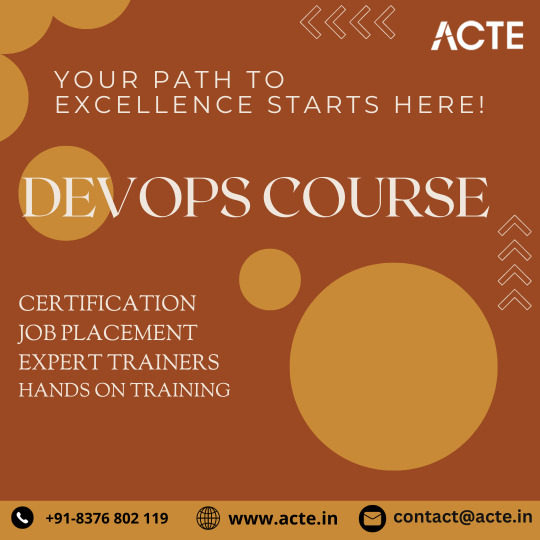
1. Embracing the Essence of Software Development: At the core of DevOps lies collaboration, making it essential for individuals to have a fundamental understanding of software development processes. Proficiency in coding practices, version control, and the collaborative nature of development projects is paramount. Additionally, a solid grasp of programming languages and scripting adds a valuable dimension to one's skill set.
2. Navigating System Administration Fundamentals: DevOps success is intricately linked to a foundational understanding of system administration. This encompasses knowledge of operating systems, networks, and infrastructure components. Such familiarity empowers DevOps professionals to adeptly manage and optimize the underlying infrastructure supporting applications.
3. Mastery of Version Control Systems: Proficiency in version control systems, with Git taking a prominent role, is indispensable. Version control serves as the linchpin for efficient code collaboration, allowing teams to track changes, manage codebases, and seamlessly integrate contributions from multiple developers.
4. Scripting and Automation Proficiency: Automation is a central tenet of DevOps, emphasizing the need for scripting skills in languages like Python, Shell, or Ruby. This skill set enables individuals to automate repetitive tasks, fostering more efficient workflows within the DevOps pipeline.
5. Embracing Containerization Technologies: The widespread adoption of containerization technologies, exemplified by Docker, and orchestration tools like Kubernetes, necessitates a solid understanding. Mastery of these technologies is pivotal for creating consistent and reproducible environments, as well as managing scalable applications.
6. Unveiling CI/CD Practices: Continuous Integration and Continuous Deployment (CI/CD) practices form the beating heart of DevOps. Acquiring knowledge of CI/CD tools such as Jenkins, GitLab CI, or Travis CI is essential. This proficiency ensures the automated execution of code testing, integration, and deployment processes, streamlining development pipelines.
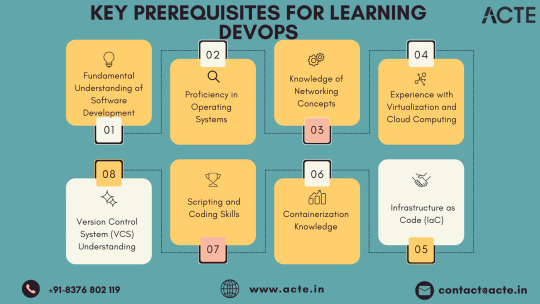
7. Harnessing Infrastructure as Code (IaC): Proficiency in Infrastructure as Code (IaC) tools, including Terraform or Ansible, constitutes a fundamental aspect of DevOps. IaC facilitates the codification of infrastructure, enabling the automated provisioning and management of resources while ensuring consistency across diverse environments.
8. Fostering a Collaborative Mindset: Effective communication and collaboration skills are non-negotiable in the DevOps sphere. The ability to seamlessly collaborate with cross-functional teams, spanning development, operations, and various stakeholders, lays the groundwork for a culture of collaboration essential to DevOps success.
9. Navigating Monitoring and Logging Realms: Proficiency in monitoring tools such as Prometheus and log analysis tools like the ELK stack is indispensable for maintaining application health. Proactive monitoring equips teams to identify issues in real-time and troubleshoot effectively.
10. Embracing a Continuous Learning Journey: DevOps is characterized by its dynamic nature, with new tools and practices continually emerging. A commitment to continuous learning and adaptability to emerging technologies is a fundamental trait for success in the ever-evolving field of DevOps.
In summary, while the transition to a DevOps role may not have rigid prerequisites, the acquisition of these foundational skills and knowledge areas becomes the bedrock for a successful journey. DevOps transcends being a mere set of practices; it embodies a cultural shift driven by collaboration, automation, and an unwavering commitment to continuous improvement. By embracing these essential building blocks, individuals can navigate their DevOps journey with confidence and competence.
5 notes
·
View notes
Text
Best DevOps Certifications for Elevating Your Skills
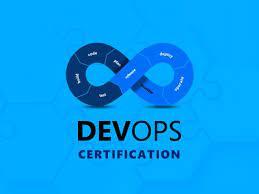
DevOps is a rapidly growing area that bridging the gap between IT and software development operations, encouraging the culture which is constantly integrating, automated and quick delivery. If you're a novice looking to start your career in the field or a seasoned professional seeking to increase your knowledge by earning the DevOps certification can greatly improve your job prospects.
This article will discuss the most beneficial DevOps certifications to be awarded in 2025 which will aid you in enhancing your capabilities and remain ahead in the ever-changing tech sector.
Why Get a DevOps Certification?
Certifications in DevOps demonstrate your expertise and experience of automation, cloud computing pipelines, CI/CD pipelines and infrastructure in code and many more. The reasons why getting a certification is useful:
Improved Career Opportunities : Certified DevOps professionals are highly sought after as top companies seek experienced engineers.
Higher Salary - Potential : The Accredited DevOps engineers earn considerably higher salaries than professionals who are not certified.
A better set of skills : Certifications can assist you in mastering tools such as Kubernetes, Docker, Ansible, Jenkins, and Terraform.
Higher job security : With the swift acceptance of DevOps methods, certified professionals have a better position in the market.
Top DevOps Certifications in 2025
1. AWS Certified DevOps Engineer – Professional
Best for: Cloud DevOps Engineers
Skills Covered: AWS automation, CI/CD pipelines, logging, and monitoring
Cost: $300
Why Choose This Certification? AWS is a dominant cloud provider, and this certification validates your expertise in implementing DevOps practices within AWS environments. It's ideal for those working with AWS services like EC2, Lambda, CloudFormation, and CodePipeline.
2. Microsoft Certified: DevOps Engineer Expert
Best for: Azure DevOps Professionals
Skills Covered: Azure DevOps, CI/CD, security, and monitoring
Cost: $165
Why Choose This Certification? If you're working in Microsoft Azure environments, this certification is a must. It covers using Azure DevOps Services, infrastructure as code with ARM templates, and managing Kubernetes deployments in Azure.
3. Google Cloud Professional DevOps Engineer
Best for: Google Cloud DevOps Engineers
Skills Covered: GCP infrastructure, CI/CD, monitoring, and incident response
Cost: $200
Why Choose This Certification? Google Cloud is growing in popularity, and this certification helps DevOps professionals validate their skills in site reliability engineering (SRE) and continuous delivery using GCP.
4. Kubernetes Certifications (CKA & CKAD)
Best for: Kubernetes Administrators & Developers
Skills Covered: Kubernetes cluster management, networking, and security
Cost: $395 each
Why Choose These Certifications? Kubernetes is the backbone of container orchestration, making these certifications essential for DevOps professionals dealing with cloud-native applications and containerized deployments.
CKA (Certified Kubernetes Administrator): Best for managing Kubernetes clusters.
CKAD (Certified Kubernetes Application Developer): Best for developers deploying apps in Kubernetes.
5. Docker Certified Associate (DCA)
Best for: Containerization Experts
Skills Covered: Docker containers, Swarm, storage, and networking
Cost: $195
Why Choose This Certification? Docker is a key component of DevOps workflows. The DCA certification helps you gain expertise in containerized applications, orchestration, and security best practices.
6. HashiCorp Certified Terraform Associate
Best for: Infrastructure as Code (IaC) Professionals
Skills Covered: Terraform, infrastructure automation, and cloud deployments
Cost: $70
Why Choose This Certification? Terraform is the leading Infrastructure as Code (IaC) tool. This certification proves your ability to manage cloud infrastructure efficiently across AWS, Azure, and GCP.
7. Red Hat Certified Specialist in Ansible Automation
Best for: Automation Engineers
Skills Covered: Ansible playbooks, configuration management, and security
Cost: $400
Why Choose This Certification? If you work with IT automation and configuration management, this certification validates your Ansible skills, making you a valuable asset for enterprises looking to streamline operations.
8. DevOps Institute Certifications (DASM, DOFD, and DOL)
Best for: DevOps Leadership & Fundamentals
Skills Covered: DevOps culture, processes, and automation best practices
Cost: Varies
Why Choose These Certifications? The DevOps Institute offers various certifications focusing on foundational DevOps knowledge, agile methodologies, and leadership skills, making them ideal for beginners and managers.
How to Choose the Right DevOps Certification?
Consider the following factors when selecting a Devops certification course online :
Your Experience Level: Beginners may start with Docker, Terraform, or DevOps Institute certifications, while experienced professionals can pursue AWS, Azure, or Kubernetes certifications.
Your Career Goals: If you work with a specific cloud provider, choose AWS, Azure, or GCP certifications. For automation, go with Terraform or Ansible.
Industry Demand: Certifications like AWS DevOps Engineer, Kubernetes, and Terraform have high industry demand and can boost your career.
Cost & Time Commitment: Some certifications require hands-on experience, practice labs, and exams, so choose one that fits your schedule and budget.
Final Thoughts
Certifications in DevOps can increase your technical knowledge and improve your chances of getting a job and enhance the amount you earn. No matter if you're looking to specialise in cloud-based platforms, automation, and containerization, you can find an option specifically designed for your specific career with Cloud Computing Certification Courses.
If you can earn at least one of these most prestigious DevOps-related certifications in 2025 You can establish yourself as a professional with a solid background in an industry that is rapidly changing.
0 notes
Text
DevOps for Edge Computing: Challenges and Opportunities
Edge computing is rapidly reshaping how organizations process and analyze data by bringing computation closer to the data source. This paradigm shift enhances speed, reduces latency, and supports applications requiring real-time decision-making, such as autonomous vehicles and IoT devices. However, the distributed nature of edge computing introduces unique challenges for DevOps practices, making it critical to adopt strategies to ensure efficiency, scalability, and reliability.
The Unique Landscape of Edge Computing
Edge computing deploys workloads across distributed locations with limited resources, enabling faster processing and reduced bandwidth usage. However, this decentralized setup adds complexity to deployment and management. Unlike centralized cloud servers, edge environments require tailored configurations for each node, emphasizing the need for robust automation to streamline processes and ensure efficiency.
Key Challenges in Implementing DevOps for Edge Computing
Fragmented Infrastructure: Edge computing environments often involve a diverse array of hardware and software platforms. Ensuring compatibility and standardization across these disparate systems is a significant challenge for DevOps teams.
Limited Resources: Unlike cloud servers, edge nodes have restricted computational power, storage, and bandwidth. DevOps practices must account for these limitations, optimizing deployments to ensure smooth operation without overloading resources.
Security Risks: With a larger attack surface due to the distributed nature of edge environments, securing deployments becomes critical. Vulnerabilities in one node can compromise the entire network, necessitating advanced security protocols and continuous monitoring.
Monitoring and Observability: Real-time insights into edge nodes are essential for maintaining performance and detecting issues. However, collecting and analyzing telemetry data from multiple locations without centralized access poses a unique challenge.
Opportunities to Leverage DevOps in Edge Computing
Despite these challenges, the integration of DevOps into edge computing presents exciting opportunities to drive innovation and efficiency:
Automation at Scale: DevOps tools like Ansible and Terraform can automate configuration management and deployment, streamlining processes across multiple edge nodes.
Containerization and Orchestration: Lightweight containers, such as those managed by Kubernetes, are ideal for edge environments. They allow applications to run consistently across diverse hardware while enabling efficient resource usage. Kubernetes distributions like K3s are tailored for edge computing, further simplifying orchestration.
Improved Resilience: Continuous integration and continuous delivery (CI/CD) pipelines in edge computing can ensure frequent updates without service interruptions. Canary deployments and blue-green strategies help validate changes in smaller environments before system-wide implementation.
Enhanced Data Processing: By integrating AI-driven DevOps tools, edge computing environments can benefit from predictive analytics and automated incident resolution. These capabilities enhance system reliability and reduce downtime.
Future Trends in DevOps for Edge Computing
The convergence of AI and edge computing is driving DevOps innovation. AI-powered tools optimize resources, predict failures, and enhance security, while 5G accelerates data transfers and responsiveness. As edge computing grows in industries like healthcare and manufacturing, flexible DevOps strategies will position organizations to capitalize on these advancements effectively.
Optimizing Edge Systems for Maximum Impact
DevOps for edge computing bridges innovation and efficiency by addressing challenges like fragmented infrastructure, resource limits, and security risks. DevOps training equips professionals to unlock edge computing's potential with seamless deployments and strong performance. ExitCertified offers expert training to help teams excel in this evolving landscape.
For more information visit: https://www.exitcertified.com/it-training/agile-devops/devops-fundamentals-66737-detail.html
0 notes
Text
Advanced DevOps Strategies: Optimizing Software Delivery and Operations
Introduction
By bridging the gap between software development and IT operations, DevOps is a revolutionary strategy that guarantees quicker and more dependable software delivery. Businesses may increase productivity and lower deployment errors by combining automation, continuous integration (CI), continuous deployment (CD), and monitoring. Adoption of DevOps has become crucial for businesses looking to improve their software development lifecycle's scalability, security, and efficiency. To optimize development workflows, DevOps approaches need the use of tools such as Docker, Kubernetes, Jenkins, Terraform, and cloud platforms. Businesses are discovering new methods to automate, anticipate, and optimize their infrastructure for optimal performance as AI and machine learning become more integrated into DevOps.
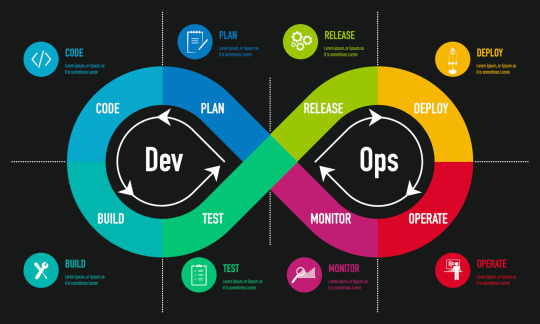
Infrastructure as Code (IaC): Automating Deployments
Infrastructure as Code (IaC), one of the fundamental tenets of DevOps, allows teams to automate infrastructure administration. Developers may describe infrastructure declaratively with tools like Terraform, Ansible, and CloudFormation, doing away with the need for manual setups. By guaranteeing repeatable and uniform conditions and lowering human error, IaC speeds up software delivery. Scalable and adaptable deployment models result from the automated provisioning of servers, databases, and networking components. Businesses may achieve version-controlled infrastructure, quicker disaster recovery, and effective resource use in both on-premises and cloud settings by implementing IaC in DevOps processes.
The Role of Microservices in DevOps
DevOps is revolutionized by microservices architecture, which makes it possible to construct applications in a modular and autonomous manner. Microservices encourage flexibility in contrast to conventional monolithic designs, enabling teams to implement separate services without impacting the program as a whole. The administration of containerized microservices is made easier by DevOps automation technologies like Docker and Kubernetes, which provide fault tolerance, scalability, and high availability. Organizations may improve microservices-based systems' observability, traffic management, and security by utilizing service mesh technologies like Istio and Consul. Microservices integration with DevOps is a recommended method for contemporary software development as it promotes quicker releases, less downtime, and better resource usage.
CI/CD Pipelines: Enhancing Speed and Reliability
Continuous Integration (CI) and Continuous Deployment (CD) are the foundation of DevOps automation, allowing for quick software changes with no interruption. Software dependability is ensured by automating code integration, testing, and deployment with tools like Jenkins, GitLab CI/CD, and GitHub Actions. By using CI/CD pipelines, production failures are decreased, development cycles are accelerated, and manual intervention is eliminated. Blue-green deployments, rollback procedures, and automated testing all enhance deployment security and stability. Businesses who use CI/CD best practices see improved time-to-market, smooth upgrades, and high-performance apps in both on-premises and cloud settings.
Conclusion
Businesses may achieve agility, efficiency, and security in contemporary software development by mastering DevOps principles. Innovation and operational excellence are fueled by the combination of IaC, microservices, CI/CD, and automation. A DevOps internship may offer essential industry exposure and practical understanding of sophisticated DevOps technologies and processes to aspiring individuals seeking to obtain practical experience.
#devOps#devOps mastery#Devops mastery course#devops mastery internship#devops mastery training#devops internship in pune#e3l#e3l.co
0 notes
Text
Becoming an AWS Solutions Architect: A Comprehensive Guide
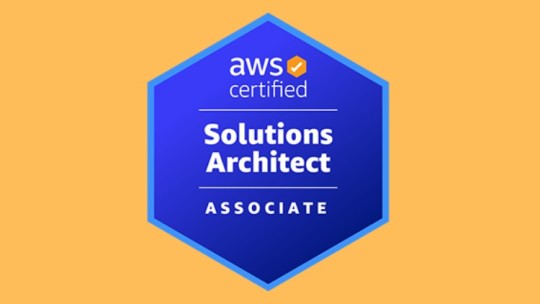
With the cloud age now, businesses are increasingly employing cloud computing platforms to cut costs, automate processes, and innovate. Among the first to pioneer cloud platforms is Amazon Web Services (AWS), which has numerous services that small, medium, and large enterprises can leverage. In order to effectively manage and optimize the services, businesses hire AWS Solutions Architects. What does it take to be an AWS Solutions Architect, and what is an AWS Solutions Architect in a business?
What is an AWS Solutions Architect?
AWS Solutions Architect is a technical professional who has the job to design, deploy, and execute scalable, secure, and high-performing cloud applications on Amazon Web Services. He cooperates with the development teams and clients in a manner that the architecture should be as per the business requirement and utilize the functionalities of AWS in the best way possible.
AWS Solutions Architects have knowledge in cloud architecture, system design, networking, and security. AWS Solutions Architects provide best-practice recommendations, cost savings, performance, and disaster recovery. AWS architects lead the way to help organizations realize maximum value of AWS in an effort to accomplish their missions.
Key Responsibilities of an AWS Solutions Architect
The work of an AWS Solutions Architect is diverse with numerous varied jobs. The essential jobs of an AWS Solutions Architect are:
Cloud Solution Design: Solutions Architects interact with stakeholders to receive business requirements and create cloud solutions that satisfy the requirements. It is performed by selecting suitable AWS services, stacking them in an open style, and designing highly available and fault-tolerant systems.
AWS Resource Monitoring and Management: They must monitor deploying and managing AWS resources such as EC2 instances, S3 buckets, RDS databases, etc. Resources must be ensured to scale as well as get optimized accordingly based on anticipated demands.
Security and Compliance: AWS Solutions Architects deploy cloud infrastructure with best-in-class security. They use encryption, access management, and identity practices to protect against sensitive information. They enable organizational compliance requirements.
Cost Optimization: Yet another of the biggest challenges of cloud deployment is managing costs. AWS Solutions Architects take into consideration usage patterns and suggest spending reduction without affecting performance. It could be selecting cost-effective services, rightsizing instances, or Reserved Instances.
Troubleshooting and Support: AWS Solutions Architects identify and fix cloud infrastructure issues. They collaborate with operations and development teams to address technical issues, ensuring the cloud environment remains up and running.
Skills and Certifications for AWS Solutions Architects
To become an AWS Solutions Architect, the candidate must possess technical as well as soft skills. Some of the most important skills and certifications are listed below:
Technical Skills
AWS Services: Strong knowledge of AWS services such as EC2, S3, Lambda, CloudFormation, VPC, and RDS.
Cloud Architecture: Experienced in designing scalable, highly available, and fault-tolerant architecture on AWS.
Networking and Security: Clear knowledge of networking fundamentals, firewalls, load balancers, and security controls in the AWS environment.
DevOps Tools: Knowledge of automated tools such as Terraform, Ansible, and CloudFormation for managing infrastructure.
Soft Skills
Problem-Solving: Solutions Architects need to have effective communication skills, wherein they can analyze and develop possible solutions to complex issues.
Communication: There is a requirement of good communication skills from the job with an effort to communicate clearly with development teams, stakeholders, and clients.
Project Management: Doing work under a series of varied projects and best possible ordering of tasks must be managed for the job.
Certifications
Experience is prioritized most, but certification aids in generating experience and interest towards learning accomplishments. AWS offers various certifications which are:
AWS Certified Solutions Architect – Associate: It is one of the recent additions in cloud architecture.
AWS Certified Solutions Architect – Professional: It is professional certification reflecting improved knowledge of AWS services and architecture design.
AWS Certified Security Specialty: It is AWS security practice-based certification.
Career Path and Opportunities for AWS Solutions Architects
The career of AWS Solutions Architects is slowly gaining momentum with more and more businesses shifting to the cloud. They begin as a cloud engineer, systems architect, or DevOps engineer in most scenarios. With the right skills, an AWS Solutions Architect can transition to senior positions such as cloud architect, enterprise architect, or even Chief Technology Officer (CTO).
Also, the majority of AWS Solutions Architects are independent consultants for various companies, and some are contracted by large companies, consulting firms, or tech companies. The profession has vast opportunities for advancement as well as work-life balance.
Conclusion
One must have a mix of technical expertise, problem-solving abilities, and in-depth knowledge regarding AWS services as well as cloud computing principles to be an AWS Solutions Architect. With cheap, safe, and adaptable cloud architecture, AWS Solutions Architects enable cloud success for companies. With more and more companies jumping on the cloud bandwagon every day, there is an endless future waiting to be taken by talented AWS Solutions Architects in a company that is expanding exponentially with profits only remaining for the rest.
0 notes
Text
Learn DevOps with Network Nuts – 100% Job Assistance & Expert Training
In today’s competitive IT industry, DevOps has become a must-have skill for professionals looking to accelerate their careers. Companies are constantly seeking skilled DevOps Engineers who can automate workflows, optimize deployments, and enhance collaboration between development and operations teams.
If you’re looking for the best DevOps training with 100% job assistance, Network Nuts is your ideal learning partner. With a team of 30+ expert trainers, hands-on learning, and a job-oriented approach, we help you master DevOps and land your dream job.
Why Choose DevOps as a Career?
🔹 High Demand – DevOps professionals are among the highest-paid in the IT industry. 🔹 Career Growth – Companies across the globe are shifting to DevOps, creating endless job opportunities. 🔹 Job Security – DevOps skills ensure long-term job stability in cloud computing and automation.
Why Learn DevOps with Network Nuts?
🚀 100% Job Assistance – We Help You Get Hired!
Our commitment doesn’t end with training – we assist you in securing high-paying DevOps jobs. Our dedicated placement team provides: ✅ Resume Building & Optimization ✅ Interview Preparation & Mock Interviews ✅ Job Referrals & Corporate Tie-Ups ✅ Career Guidance & Soft Skills Training
�� Learn from 30+ Industry Experts
With over 30+ certified trainers, you get real-world experience, mentorship, and deep insights into the latest DevOps technologies.
🛠️ Hands-on, Practical Learning Approach
At Network Nuts, we believe in learning by doing. Our training includes: ✅ Real-World Projects & Case Studies ✅ Live Practical Labs & Assignments ✅ Simulation of IT Work Environments
🌍 Flexible Online & Classroom Training
Whether you prefer self-paced learning, live online sessions, or classroom training, we provide flexible learning options tailored to your needs.
🎯 Certifications & Job Readiness
Get industry-recognized certifications and stand out in job interviews. We help you prepare for: ✅ AWS Certified DevOps Engineer ✅ Kubernetes Certifications (CKA, CKAD) ✅ Terraform & Ansible Certifications
Who Can Join This DevOps Course?
💼 IT Professionals looking to transition into DevOps 💻 System Administrators & Cloud Engineers 🛠️ Software Developers & Testers 🎓 Freshers & Graduates aiming for an IT career
Join Network Nuts & Kickstart Your DevOps Career Today!
With 100% job assistance, hands-on training, and expert mentorship, Network Nuts ensures that you learn, practice, and get hired in top IT companies.
Why Should You Learn DevOps Now?
✔ High-Paying Jobs – DevOps Engineers earn an average salary of ₹8L–₹30L per year. ✔ Huge Demand – Companies like Amazon, Google, and Infosys are hiring DevOps experts daily. ✔ Fast Career Growth – DevOps opens doors to SRE, Cloud Architect, and Automation Engineer roles.
What Makes Network Nuts Different?
✅ Learn from 30+ Industry Experts – Hands-on training from experienced professionals. ✅ 100% Job Assistance – Resume building, mock interviews & guaranteed job referrals. ✅ Practical Learning – Real-world projects, live sessions & certification support. ✅ Master In-Demand Tools – Linux, Docker, Kubernetes, Terraform, Jenkins & AWS. ✅ Flexible Learning Options – Online & classroom training to fit your schedule.
🎯 Who Can Join?
🔹 IT Professionals looking to switch to DevOps 🔹 Freshers & Graduates aiming for a high-paying IT career 🔹 System Administrators & Developers wanting to upskill 🔹 Cloud & Networking Engineers seeking automation expertise 🔹 Non It Can also do DevOps
🚀 Don’t Wait—Take Action NOW! 📞 Call us today: +91 98180 40117 🌍 Visit our website & Enroll: https://www.networknuts.net/
👉 Limited Seats Available! Start Your DevOps Journey Today!
🚀 Don’t wait! Book a free demo session and take the first step toward your DevOps career.
👉 Visit Network Nuts Website to enroll now!
#Devops Course online#Devops Online Training#Learn Devops#Devops certificate course#Devops#Networknuts
1 note
·
View note
Text
Building Scalable Infrastructure with Ansible and Terraform

Building Scalable Infrastructure with Ansible and Terraform
Modern cloud environments require scalable, efficient, and automated infrastructure to meet growing business demands. Terraform and Ansible are two powerful tools that, when combined, enable Infrastructure as Code (IaC) and Configuration Management, allowing teams to build, manage, and scale infrastructure seamlessly.
1. Understanding Terraform and Ansible
📌 Terraform: Infrastructure as Code (IaaC)
Terraform is a declarative IaaC tool that enables provisioning and managing infrastructure across multiple cloud providers.
🔹 Key Features: ✅ Automates infrastructure deployment. ✅ Supports multiple cloud providers (AWS, Azure, GCP). ✅ Uses HCL (HashiCorp Configuration Language). ✅ Manages infrastructure as immutable code.
🔹 Use Case: Terraform is used to provision infrastructure — such as setting up VMs, networks, and databases — before configuration.
📌 Ansible: Configuration Management & Automation
Ansible is an agentless configuration management tool that automates software installation, updates, and system configurations.
🔹 Key Features: ✅ Uses YAML-based playbooks. ✅ Agentless architecture (SSH/WinRM-based). ✅ Idempotent (ensures same state on repeated runs). ✅ Supports cloud provisioning and app deployment.
🔹 Use Case: Ansible is used after infrastructure provisioning to configure servers, install applications, and manage deployments.
2. Why Use Terraform and Ansible Together?
Using Terraform + Ansible combines the strengths of both tools:
TerraformAnsibleCreates infrastructure (VMs, networks, databases).Configures and manages infrastructure (installing software, security patches). Declarative approach (desired state definition).Procedural approach (step-by-step execution).Handles infrastructure state via a state file. Doesn’t track state; executes tasks directly. Best for provisioning resources in cloud environments. Best for managing configurations and deployments.
Example Workflow: 1️⃣ Terraform provisions cloud infrastructure (e.g., AWS EC2, Azure VMs). 2️⃣ Ansible configures servers (e.g., installs Docker, Nginx, security patches).
3. Building a Scalable Infrastructure: Step-by-Step
Step 1: Define Infrastructure in Terraform
Example Terraform configuration to provision AWS EC2 instances:hclprovider "aws" { region = "us-east-1" }resource "aws_instance" "web" { ami = "ami-12345678" instance_type = "t2.micro" tags = { Name = "WebServer" } }
Step 2: Configure Servers Using Ansible
Example Ansible Playbook to install Nginx on the provisioned servers:yaml- name: Configure Web Server hosts: web_servers become: yes tasks: - name: Install Nginx apt: name: nginx state: present - name: Start Nginx Service service: name: nginx state: started enabled: yes
Step 3: Automate Deployment with Terraform and Ansible
1️⃣ Use Terraform to create infrastructure:bash terraform init terraform apply -auto-approve
2️⃣ Use Ansible to configure servers:bashansible-playbook -i inventory.ini configure_web.yaml
4. Best Practices for Scalable Infrastructure
✅ Modular Infrastructure — Use Terraform modules for reusable infrastructure components. ✅ State Management — Store Terraform state in remote backends (S3, Terraform Cloud) for team collaboration. ✅ Use Dynamic Inventory in Ansible — Fetch Terraform-managed resources dynamically. ✅ Automate CI/CD Pipelines — Integrate Terraform and Ansible with Jenkins, GitHub Actions, or GitLab CI. ✅ Follow Security Best Practices — Use IAM roles, secrets management, and network security groups.
5. Conclusion
By combining Terraform and Ansible, teams can build scalable, automated, and well-managed cloud infrastructure.
Terraform ensures consistent provisioning across multiple cloud environments, while Ansible simplifies configuration management and application deployment.
WEBSITE: https://www.ficusoft.in/devops-training-in-chennai/
0 notes
Text
Why Infrastructure as Code is a Game-Changer for DevOps Teams
Introduction
In today’s fast-paced, cloud-driven world, the success of DevOps teams hinges on automation, speed, and consistency. Infrastructure as Code (IaC) has become one of the most transformative technologies in DevOps, enabling teams to provision and manage infrastructure with the same ease and versioning control as software development. By leveraging IaC, DevOps teams can create, update, and manage infrastructure resources through machine-readable code, reducing manual intervention and human errors.
This article explores why Infrastructure as Code is a game-changer for DevOps teams, highlighting its benefits, challenges, and real-world applications.
What is Infrastructure as Code (IaC)?
Infrastructure as Code is the practice of managing and provisioning computing infrastructure through code rather than manual processes. With IaC, DevOps teams can use configuration files to describe the desired state of their infrastructure—such as virtual machines, networks, load balancers, and storage—ensuring that it is provisioned and configured automatically without requiring human intervention.
IaC tools such as Terraform, AWS CloudFormation, Ansible, and Chef allow teams to automate infrastructure management, making it repeatable, scalable, and easy to maintain. This approach is foundational for achieving true DevOps automation.
Why IaC is a Game-Changer for DevOps Teams
Consistency and Reproducibility Traditionally, infrastructure management has been a manual process, prone to inconsistencies due to human error, differing environments, or variations in configuration. IaC ensures that infrastructure is defined in code, which can be version-controlled, tested, and reviewed, just like application code. Key Benefits:
Reduced Configuration Drift: With IaC, teams can enforce consistent configurations across development, testing, staging, and production environments, eliminating the risk of configuration drift.
Version Control and Audit Trails: IaC configurations are stored in version control systems like Git, allowing teams to track changes, revert to previous configurations, and maintain an audit trail of infrastructure modifications.
Real-World Example: A global SaaS company leveraged IaC to automate their infrastructure provisioning, ensuring that all development and production environments were identical. This reduced errors associated with manual configurations and improved the consistency of deployments.
Automation and Speed One of the most significant advantages of IaC is automation. Traditional infrastructure provisioning often involved manual steps that were time-consuming, error-prone, and often needed to be repeated for different environments. IaC eliminates this by automating infrastructure deployment, saving time and resources. Key Benefits:
Faster Provisioning: Infrastructure can be provisioned and deployed in minutes rather than hours or days, significantly improving deployment cycles.
Continuous Integration/Continuous Deployment (CI/CD) Integration: IaC integrates seamlessly with CI/CD pipelines, enabling automated infrastructure updates alongside application deployments, further accelerating the development lifecycle.
Real-World Example: A DevOps team used Terraform to automatically provision AWS infrastructure, reducing deployment time from hours to minutes. This increased the speed at which the team could push new features to production.
Scalability and Flexibility Modern applications often need to scale quickly in response to changes in traffic or demand. With IaC, infrastructure provisioning is no longer a manual process but a programmable one, which allows for automatic scaling based on the application’s needs. Key Benefits:
Efficient Resource Management: IaC allows for automated scaling of resources, ensuring that infrastructure can grow or shrink based on traffic demands without manual intervention.
Cloud-Native Architecture Support: IaC works seamlessly with cloud platforms like AWS, Google Cloud, and Azure, enabling teams to leverage cloud-native services, autoscaling, and elasticity.
Real-World Example: A media streaming company adopted IaC to automatically scale their infrastructure based on demand. During peak times, their infrastructure scaled to meet demand, and it scaled back down when traffic decreased, saving costs on unused resources.
Cost Efficiency IaC not only improves speed and scalability but also optimizes costs. By automating infrastructure provisioning and scaling, IaC ensures that resources are used efficiently, which can lead to significant savings, especially in cloud environments where you pay for what you use. Key Benefits:
Cost Control: With IaC, resources can be provisioned and de-provisioned automatically based on usage patterns, helping to avoid over-provisioning and reducing waste.
Cost Prediction: Teams can model infrastructure costs through IaC, providing clearer visibility into future infrastructure expenses.
Real-World Example: A financial services company integrated IaC with their cloud management platform to automatically scale their infrastructure based on demand. As a result, they reduced over-provisioning costs by 25% and were able to predict their infrastructure costs more accurately.
Improved Collaboration and Team Efficiency IaC brings developers, operations teams, and security professionals closer together. By using code to define infrastructure, teams can collaborate more effectively, share knowledge, and avoid silos in their workflows. Key Benefits:
Cross-Functional Collaboration: Developers can now write and review infrastructure code, enabling smoother collaboration between development, operations, and security teams.
Shared Responsibility: Since the infrastructure is defined in code, it becomes a shared responsibility across teams. Developers can ensure that infrastructure is version-controlled and that configurations are consistent across environments.
Real-World Example: A DevOps team at a healthcare provider used IaC to automate security compliance checks in their cloud infrastructure. Developers were able to collaborate more effectively with security teams, ensuring that security policies were applied consistently across environments.
Disaster Recovery and Infrastructure Replication Infrastructure as Code makes it easier to replicate environments and recover from failures. If a disaster occurs or if a new environment needs to be spun up, IaC can automatically rebuild infrastructure from scratch based on predefined configurations. Key Benefits:
Automated Disaster Recovery: IaC ensures that infrastructure can be quickly and consistently restored in the event of a failure, reducing recovery time and minimizing downtime.
Environment Replication: Teams can replicate environments across regions or cloud platforms, ensuring high availability and disaster recovery capabilities.
Real-World Example: A global e-commerce platform uses IaC to automate disaster recovery procedures, allowing them to rapidly deploy a backup environment in case of an outage in one region, ensuring zero downtime during traffic spikes.
Security and Compliance Managing security and compliance is a critical aspect of any cloud infrastructure. IaC allows security policies, network configurations, and access controls to be codified and automatically applied across all environments, ensuring consistency and reducing the risk of human error. Key Benefits:
Security as Code: IaC allows security practices to be baked into the deployment process, ensuring that all infrastructure follows predefined security standards.
Compliance Automation: With IaC, compliance standards can be automatically enforced through version-controlled configurations, ensuring that infrastructure adheres to industry standards and regulations.
Real-World Example: A fintech company used IaC to automate compliance with PCI-DSS requirements for their infrastructure, reducing the manual effort and ensuring that all infrastructure deployments met security guidelines.
Challenges of Implementing IaC
While Infrastructure as Code provides significant benefits, there are challenges to consider:
Learning Curve: Teams must invest time in learning IaC tools and practices. This may require training and upskilling, particularly for developers and operations teams new to infrastructure management.
Complexity in Large-Scale Environments: For large, complex systems, managing infrastructure code and ensuring consistency across environments can become challenging, particularly when dealing with multiple cloud providers.
Tool Integration: Different IaC tools have varying degrees of integration with other platforms and services, so choosing the right tools for your ecosystem is crucial.
Conclusion
Infrastructure as Code is undeniably a game-changer for DevOps teams, offering benefits such as automation, consistency, speed, cost optimization, and improved collaboration. By treating infrastructure as code, organizations like Salzen can drive efficiency, reduce errors, and rapidly scale cloud applications. However, like any transformative technology, IaC requires careful planning and the right set of tools to ensure successful adoption.
As cloud environments grow more complex, IaC will remain a key enabler of automation and agility, allowing DevOps teams to meet the challenges of modern infrastructure management while fostering a culture of collaboration, security, and continuous improvement.
0 notes
Text
Building Your Portfolio: DevOps Projects to Showcase During Your Internship
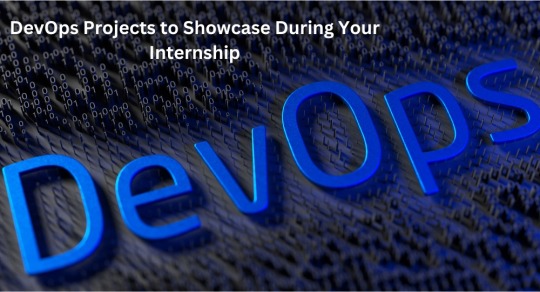
In the fast-evolving world of DevOps, a well-rounded portfolio can make all the difference when it comes to landing internships or securing full-time opportunities. Whether you’re new to DevOps or looking to enhance your skills, showcasing relevant projects in your portfolio demonstrates your technical abilities and problem-solving skills. Here’s how you can build a compelling DevOps portfolio with standout projects.https://internshipgate.com
Why a DevOps Portfolio Matters
A strong DevOps portfolio showcases your technical expertise and your ability to solve real-world challenges. It serves as a practical demonstration of your skills in:
Automation: Building pipelines and scripting workflows.
Collaboration: Managing version control and working with teams.
Problem Solving: Troubleshooting and optimizing system processes.
Tool Proficiency: Demonstrating your experience with tools like Docker, Kubernetes, Jenkins, Ansible, and Terraform.
By showcasing practical projects, you’ll not only impress potential recruiters but also stand out among other candidates with similar academic qualifications.
DevOps Projects to Include in Your Portfolio
Here are some project ideas you can work on to create a standout DevOps portfolio:
Automated CI/CD Pipeline
What it showcases: Your understanding of continuous integration and continuous deployment (CI/CD).
Description: Build a pipeline using tools like Jenkins, GitHub Actions, or GitLab CI/CD to automate the build, test, and deployment process. Use a sample application and deploy it to a cloud environment like AWS, Azure, or Google Cloud.
Key Features:
Code integration with GitHub.
Automated testing during the CI phase.
Deployment to a staging or production environment.
Containerized Application Deployment
What it showcases: Proficiency with containerization and orchestration tools.
Description: Containerize a web application using Docker and deploy it using Kubernetes. Demonstrate scaling, load balancing, and monitoring within your cluster.
Key Features:
Create Docker images for microservices.
Deploy the services using Kubernetes manifests.
Implement health checks and auto-scaling policies.
Infrastructure as Code (IaC) Project
What it showcases: Mastery of Infrastructure as Code tools like Terraform or AWS CloudFormation.
Description: Write Terraform scripts to create and manage infrastructure on a cloud platform. Automate tasks such as provisioning servers, setting up networks, and deploying applications.
Key Features:
Manage infrastructure through version-controlled code.
Demonstrate multi-environment deployments (e.g., dev, staging, production).
Monitoring and Logging Setup
What it showcases: Your ability to monitor applications and systems effectively.
Description: Set up a monitoring and logging system using tools like Prometheus, Grafana, or ELK Stack (Elasticsearch, Logstash, and Kibana). Focus on visualizing application performance and troubleshooting issues.
Key Features:
Dashboards displaying metrics like CPU usage, memory, and response times.
Alerts for critical failures or performance bottlenecks.
Cloud Automation with Serverless Frameworks
What it showcases: Familiarity with serverless architectures and cloud services.
Description: Create a serverless application using AWS Lambda, Azure Functions, or Google Cloud Functions. Automate backend tasks like image processing or real-time data processing.
Key Features:
Trigger functions through API Gateway or cloud storage.
Integrate with other cloud services such as DynamoDB or Firestore.
Version Control and Collaboration Workflow
What it showcases: Your ability to manage and collaborate on code effectively.
Description: Create a Git workflow for a small team, implementing branching strategies (e.g., Git Flow) and pull request reviews. Document the process with markdown files.
Key Features:
Multi-branch repository with clear workflows.
Documentation on resolving merge conflicts.
Clear guidelines for code reviews and commits.
Tips for Presenting Your Portfolio
Once you’ve completed your projects, it’s time to present them effectively. Here are some tips:
Use GitHub or GitLab
Host your project repositories on platforms like GitHub or GitLab. Use README files to provide an overview of each project, including setup instructions, tools used, and key features.
Create a Personal Website
Build a simple website to showcase your projects visually. Use tools like Hugo, Jekyll, or WordPress to create an online portfolio.
Write Blogs or Case Studies
Document your projects with detailed case studies or blogs. Explain the challenges you faced, how you solved them, and the outcomes.
Include Visuals and Demos
Add screenshots, GIFs, or video demonstrations to highlight key functionalities. If possible, include live demo links to deployed applications.
Organize by Skills
Arrange your portfolio by categories such as automation, cloud computing, or monitoring to make it easy for recruiters to identify your strengths.
Final Thoughtshttps://internshipgate.com
Building a DevOps portfolio takes time and effort, but the results are worth it. By completing and showcasing hands-on projects, you demonstrate your technical expertise and passion for the field. Start with small, manageable projects and gradually take on more complex challenges. With a compelling portfolio, you’ll be well-equipped to impress recruiters and excel in your internship interviews.
#career#internship#virtualinternship#internshipgate#internship in india#education#devops#virtual internship#job opportunities
1 note
·
View note
Text
Building the DevOps Foundation: Essential Skills for Success in Software Development
In the ever-evolving domain of software development, DevOps has emerged as a transformative force, reshaping how organizations approach the entire software development and delivery lifecycle. While there are no strict prerequisites for entering the DevOps realm, acquiring foundational skills significantly enhances the ability to understand and implement DevOps principles effectively. For those aiming to validate their DevOps proficiency and boost career prospects, pursuing DevOps Training in Hyderabad becomes a strategic move. This comprehensive guide explores the essential skills paving the way for a successful journey into DevOps.

Grasping Software Development Basics: A solid understanding of coding, version control, and the software development life cycle (SDLC) forms the bedrock before venturing into DevOps practices. This knowledge bridges the gap between development and operations teams.
Operating Systems Proficiency: Operating systems, especially Linux, underpin many DevOps environments. Foundational knowledge of Linux, including command-line operations and system administration, proves highly beneficial for effective interaction in DevOps scenarios.
Networking Concepts Mastery: DevOps professionals frequently engage with network configurations. Fundamental knowledge of networking concepts, such as IP addresses, subnets, firewalls, and DNS, proves invaluable for seamless application deployment.
Virtualization and Cloud Computing Experience: Virtualization and cloud platforms are integral to DevOps. Familiarity with technologies like VMware, VirtualBox, and leading cloud platforms such as AWS, Azure, or Google Cloud is essential for deploying applications in dynamic cloud environments.
Version Control System (VCS) Expertise: Proficiency in version control systems, with Git being a notable example, is fundamental in DevOps. Understanding version control workflows ensures smooth collaboration and effective code management.
Scripting and Coding Skills Advantage: While not mandatory, scripting skills in languages like Bash, Python, or PowerShell offer a significant advantage in DevOps. Automation scripts streamline repetitive tasks, enhancing the efficiency of DevOps workflows.

Containerization Knowledge Enhancement: Containers, exemplified by Docker, play a pivotal role in DevOps. Understanding containerization concepts and tools facilitates consistent and portable application deployment across diverse environments.
Continuous Integration (CI) and Continuous Deployment (CD) Mastery: DevOps emphasizes CI/CD practices. Familiarity with these concepts and hands-on experience with tools like Jenkins or GitLab CI are crucial for delivering high-quality software through automated testing.
Infrastructure as Code (IaC) Competence: IaC, a fundamental DevOps principle, involves managing infrastructure through code. Familiarity with IaC tools like Terraform or Ansible streamlines infrastructure deployment and management.
Soft Skills Emphasis: In addition to technical prowess, effective communication and collaboration skills are indispensable in a DevOps setting. Strong interpersonal skills contribute to the culture of collaboration that defines DevOps.
Getting Started with DevOps involves not just meeting prerequisites but embracing a mindset of continuous learning and improvement. While these foundational skills provide a robust start, consider enrolling in a reputable DevOps training program for practical experience and industry insights. The dynamic and rewarding world of DevOps awaits those ready to embark on a journey of continuous growth and innovation.
2 notes
·
View notes
Text
CAREER IN DEVOPS IN PUNE
Skills Required for a Career in DevOps
To excel in DevOps, professionals need a mix of technical and soft skills:
1. Technical Skills:
Version Control Systems: Proficiency in Git and other version control tools is essential.
CI/CD Pipelines: Understanding continuous integration and continuous delivery (CI/CD) tools like Jenkins, GitLab CI/CD, or CircleCI.
Scripting and Programming: Knowledge of Python, Bash, or Ruby to automate tasks and manage infrastructure.
Cloud Platforms: Familiarity with AWS, Azure, or Google Cloud is crucial for managing cloud-based applications.
Containerization and Orchestration: Experience with Docker and Kubernetes for deploying and scaling applications.
Infrastructure as Code (IaC): Using tools like Terraform or Ansible to manage infrastructure programmatically.
Monitoring and Logging: Skills in tools such as Prometheus, Grafana, or ELK Stack to ensure system reliability.
2. Soft Skills:
Collaboration: DevOps thrives on teamwork and effective communication.
Problem-Solving: The ability to identify and resolve issues quickly is critical.
Adaptability: DevOps professionals must stay updated with evolving technologies and methodologies.
Time Management: Balancing multiple responsibilities and meeting tight deadlines is key.
Career Paths in DevOps
A career in DevOps offers diverse opportunities, including:
DevOps Engineer: Designing and implementing automation tools and processes to streamline development and deployment.
Site Reliability Engineer (SRE): Focusing on system reliability, scalability, and performance.
Cloud Engineer: Managing cloud infrastructure and optimizing resource usage.
Platform Engineer: Building and maintaining internal platforms to support software development teams.
Release Manager: Overseeing the release process to ensure smooth and timely deployments.
DevSecOps Specialist: Integrating security practices into the DevOps pipeline.
Steps to Start Your Career in DevOps
Learn the Basics: Start with foundational knowledge of operating systems, networking, and programming languages.
Master Version Control: Gain proficiency in Git and understand how to manage code repositories.
Explore CI/CD Tools: Familiarize yourself with tools like Jenkins or GitLab CI/CD to automate workflows.
Dive into Cloud Computing: Learn about cloud platforms and their services, such as AWS EC2, Azure Kubernetes Service, or Google Cloud’s Compute Engine.
Practice Containerization: Gain hands-on experience with Docker and Kubernetes.
Understand Infrastructure as Code: Learn tools like Terraform or Ansible to automate infrastructure management.
Earn Certifications: Consider certifications like AWS Certified DevOps Engineer, Docker Certified Associate, or Kubernetes Administrator to validate your expertise.
Build Projects: Apply your skills by working on real-world projects, such as setting up CI/CD pipelines or deploying applications in the cloud.
Network and Seek Mentorship: Join DevOps communities, attend meetups, and connect with experienced professionals for guidance.
Challenges in a DevOps Career
While DevOps offers exciting opportunities, it also comes with challenges:
Continuous Learning: Staying updated with rapidly changing tools and practices requires ongoing effort.
Balancing Speed and Quality: Ensuring fast delivery without compromising quality can be demanding.
Handling Complex Systems: Managing large-scale systems with numerous components can be challenging.
Conclusion
A career in DevOps is an excellent choice for individuals passionate about technology, collaboration, and problem-solving. As businesses increasingly rely on digital transformation, the demand for skilled DevOps professionals will only grow. By developing the right skills, gaining hands-on experience, and staying adaptable, you can build a successful and fulfilling career in this exciting field.
VISIT-https://www.sevenmentor.com/devops-training-in-pune.php
1 note
·
View note
Text
DevOps Training in Pune - Job Assistance
The IT industry is evolving rapidly, and with it, the demand for skilled professionals in DevOps is soaring. DevOps—an approach that combines development and operations—has revolutionized how organizations deploy and manage software. As companies increasingly adopt this methodology, the need for proficient DevOps engineers continues to rise. If you're looking to upskill in DevOps, Online DevOps Training in Pune or DevOps Training in Pune offers an excellent opportunity to kickstart your career.

At CloudWorld, we provide some of the best DevOps classes in Pune, offering comprehensive training in DevOps tools and practices. Whether you are a beginner or someone looking to enhance your skills, CloudWorld's DevOps course in Pune ensures that you gain the expertise needed to thrive in this high-demand field.
Why Choose DevOps Training?
DevOps practices improve collaboration between development and operations teams, leading to quicker and more reliable software releases. DevOps engineers play a key role in building automated pipelines, integrating continuous testing, and ensuring the efficiency of cloud infrastructure. Here’s why DevOps is essential for your career:
In-Demand Skills: With the growing adoption of cloud technologies and CI/CD pipelines, DevOps engineers are in high demand.
Higher Salaries: Due to the specialized skills required, DevOps professionals enjoy attractive salaries and job stability.
Faster Career Growth: The dynamic nature of DevOps provides ample opportunities for career advancement in leading tech companies.
Benefits of DevOps Training in Pune at CloudWorld
When it comes to choosing a DevOps course in Pune, CloudWorld stands out for several reasons. We offer DevOps classes in Pune that provide hands-on experience with industry-standard tools and platforms. Here's why CloudWorld is considered one of the best DevOps training institutes in Pune:
1. Comprehensive Curriculum
CloudWorld’s DevOps classes in Pune cover everything you need to become proficient in the field. You’ll learn about the latest technologies such as:
Version Control (Git)
CI/CD Tools (Jenkins, Bamboo)
Containerization (Docker, Kubernetes)
Cloud Platforms (AWS, Azure)
Infrastructure as Code (Terraform, Ansible)
Monitoring & Logging Tools (Prometheus, Grafana)
2. Expert Trainers
The trainers at CloudWorld are seasoned DevOps professionals with years of experience working with top organizations. They bring real-world insights to the classroom, ensuring you not only learn theoretical concepts but also understand how to apply them practically.
3. Hands-On Learning
CloudWorld emphasizes practical training. Through real-world projects and interactive labs, you will gain the experience required to manage actual DevOps processes and workflows.
4. Flexible Learning Options
For those who prefer the flexibility of online learning, CloudWorld offers online DevOps training in Pune. Whether you are working full-time or have other commitments, our online classes allow you to learn at your own pace from the comfort of your home.
5. Job Placement Assistance
CloudWorld offers DevOps classes in Pune with placement assistance to help you transition from learning to employment. We partner with some of the top companies to provide placement support for our students. Additionally, we offer:
Resume Building Assistance
Interview Preparation
Mock Interviews
This ensures that you are job-ready by the time you complete your training.
Why Pune is the Ideal Place for DevOps Training
Pune is home to a thriving IT ecosystem, with numerous startups and multinational corporations looking for skilled DevOps professionals. Many leading companies, such as Infosys, TCS, and Cognizant, are based in or have offices in Pune, making it an ideal location for DevOps training and career opportunities.
The city also offers a wide range of networking opportunities, allowing you to connect with professionals, attend tech meetups, and stay updated on industry trends.
AWS DevOps Classes in Pune
CloudWorld is one of the leading institutes offering AWS DevOps classes in Pune. AWS (Amazon Web Services) is a widely used cloud platform in DevOps environments, and proficiency in AWS is a crucial skill for any DevOps engineer. Our AWS DevOps course will cover the integration of AWS with DevOps tools and practices, including automating cloud infrastructure, configuring CI/CD pipelines, and deploying applications on AWS.
Conclusion: Start Your DevOps Career with CloudWorld
Whether you are looking for online DevOps training in Pune, or you prefer to attend DevOps classes in Pune in person, CloudWorld is the ideal destination to gain the skills you need. Our best DevOps training institute in Pune ensures that you are equipped with the necessary tools, expertise, and practical experience to land your dream job in DevOps.
With placement support, expert trainers, and a comprehensive curriculum, CloudWorld is committed to helping you succeed. Enroll in CloudWorld’s DevOps course in Pune today and take the first step toward a rewarding career in this fast-growing field.
#online devops training in pune#devops training in pune#devops classes in pune#devops course in pune#best devops classes in pune#aws devops classes in pune#best devops training institute in pune#devops classes in pune with placement
0 notes
Text
How to Start Your Career in Cloud Computing: A Beginner's Guide

Cloud computing has dramatically changed the IT landscape and offers thousands of opportunities for those who work in this fast-changing environment. Whether you are an individual looking to begin a career in cloud computing or a professional who is changing his or her career, this beginner's guide will help you to find your direction.
Why Should You Pursue a Career in Cloud Computing?
The cloud is the modern backbone of digital infrastructure. It ranges from start-ups to worldwide conglomerates, in which companies utilize the cloud as a platform for applications, storage, and even remote collaboration. According to recent industry reports, demand for professionals who work on cloud is high. Some roles in high demand are cloud engineers, architects, and DevOps specialists. Advantages of a Cloud Computing Career
High Demand: Organizations of all industries are embracing cloud technologies, and that is creating many job openings.
Lucrative Salaries: Cloud professionals can command competitive salaries because of the specialized skill set.
Career Growth: Opportunities abound for advancement up to senior engineering, architecture, and leadership positions.
Flexibility: Many of the roles provide remote work options, which provides work-life balance and location independence.
Step 1: Understand the Basics of Cloud Computing
Before getting into cloud certifications or courses, you would learn the basics first. Therefore, you will get to understand what exactly cloud computing is, its deployment models: public, private, hybrid, and service models: IaaS, PaaS, SaaS. Some of the main sources are YouTube tutorials, blogs, and introductory courses.
Key Concepts to Learn:
Cloud platforms like AWS, Azure, and Google Cloud
Virtualization and containerization
Networking and storage basics
Step 2: Enroll in a Cloud Computing and DevOps Course
You may find a structured cloud computing and DevOps course that can really expedite your learning curve. These are hands-on, so you would be building skills in real-life scenarios. Then, look for programs that will include projects like:
Setting up virtual machines and cloud environments
Deploying and managing containers with Docker and Kubernetes
Automating with tools like Jenkins, Terraform, and Ansible
When selecting a course, ensure that it covers the most popular cloud providers (AWS, Azure, Google Cloud) and the principles of DevOps. Add significant weight to your resume by obtaining certifications like AWS Certified Solutions Architect, Microsoft Azure Fundamentals, or Google Cloud Certified.
Step 3: Practical Experience
Theory alone won’t cut it. Employers look for hands-on experience in managing cloud environments. Use free-tier accounts on AWS, Azure, or Google Cloud to experiment with creating virtual machines, deploying web applications, and configuring networks. Participate in hackathons, contribute to open-source projects, or build a personal portfolio showcasing your cloud skills.
Step 4: Get Certified
Certifications validate your expertise and enhance your credibility. Depending on your interest and career goals, consider:
AWS Certified Solutions Architect-Associate
Microsoft Certified: Azure Administrator Associate
Google Cloud Professional Cloud Architect
Certified Kubernetes Administrator (CKA)
These certifications are known worldwide, and you will see these on your resume. This is proof that you know a specific kind of cloud technology well.
Step 5: Supplement Skills
Cloud computing also touches on DevOps, cybersecurity, and data analytics. You become a more versatile professional with additional skills. Try the following:
Programming: Become conversant in Python, Java, or Bash scripting.
DevOps Practices: Know your CI/CD pipelines and automation tools.
Security: Learn about cloud security principles to protect data.
Step 6: Network and Stay Updated
Join online communities, attend webinars, and participate in tech meetups to stay connected with industry trends. Follow thought leaders in cloud computing and DevOps on LinkedIn and Twitter. Staying updated ensures you remain competitive in this fast-evolving field.
Final Thoughts
It is relatively intimidating to be a beginner cloud computing professional in today's world of high-tech networking, but definitely doable in the right method. Start solid, take up a cloud computing and DevOps course, and practically experience it because practice makes more confident. Things are bright as far as opportunities are concerned; hence, determination and persistence create a rewarding avenue in this vast exciting domain called cloud.
0 notes
Text
Skills Necessary to Become a DevOps Engineer
Embarking on a career in DevOps requires a unique combination of technical and soft skills.
For those keen to excel in Devops, enrolling in Devops Course in Chennai can be highly advantageous. Such a program provides a unique opportunity to acquire comprehensive knowledge and practical skills crucial for mastering Devops.
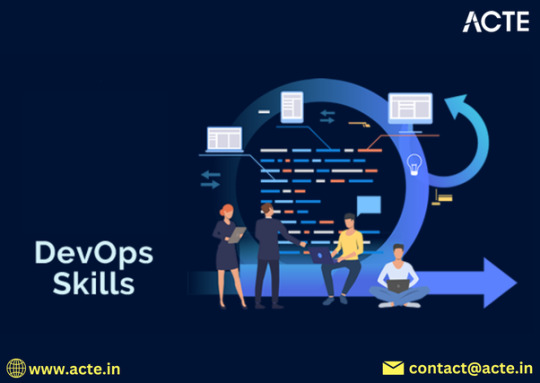
Here’s a detailed look at the key skills essential for success in this dynamic field.
1. DevOps Principles and Practices
Cultural Awareness: Understanding the core principles of DevOps, including collaboration, automation, and continuous improvement.
2. Programming Languages
Coding Proficiency: Familiarity with programming languages such as Python, Ruby, or Java, which are crucial for automating tasks and developing software.
3. Scripting Knowledge
Shell Scripting: Skills in scripting languages like Bash or PowerShell to automate system tasks and manage environments efficiently.
4. Version Control Systems
Git Expertise: Proficiency in using Git for version control to track changes in code and collaborate effectively with team members.
5. Containerization Technologies
Docker and Kubernetes: Understanding how to use containerization tools for deploying, scaling, and managing applications in a cloud environment.
6. Cloud Computing Skills
Cloud Platform Familiarity: Knowledge of cloud services and architectures, particularly with providers like AWS, Azure, and Google Cloud, to deploy applications and manage resources.
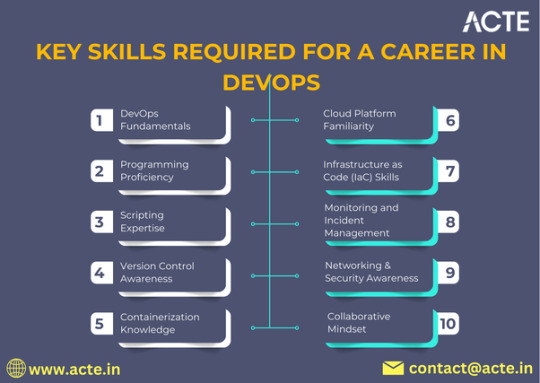
Enrolling in Devops Online Course can enable individuals to unlock DevOps full potential and develop a deeper understanding of its complexities.
7. Infrastructure as Code (IaC)
Automation Tools: Experience with IaC tools like Terraform or Ansible to automate the provisioning and management of infrastructure.
8. Monitoring and Analytics
Monitoring Tools: Proficiency in using monitoring platforms (like Prometheus or Grafana) to track application performance and manage incidents.
9. Networking Fundamentals
Networking Concepts: Understanding basic networking principles, protocols, and security practices to maintain secure and efficient systems.
10. Soft Skills and Collaboration
Team Communication: Strong interpersonal skills to foster collaboration between development and operations teams, ensuring effective communication and shared objectives.
Conclusion
Building a successful career in DevOps demands a well-rounded skill set that encompasses both technical expertise and soft skills. By developing these key skills, individuals can effectively contribute to the seamless integration of development and operations, driving innovation and efficiency in software delivery. Continuous learning and adapting to new tools will further enhance career prospects in this ever-evolving field.
0 notes